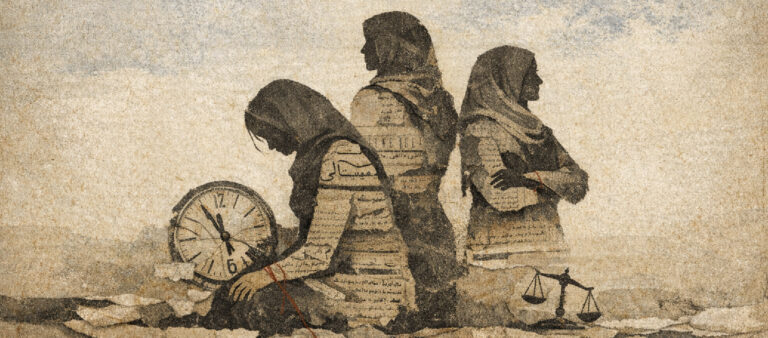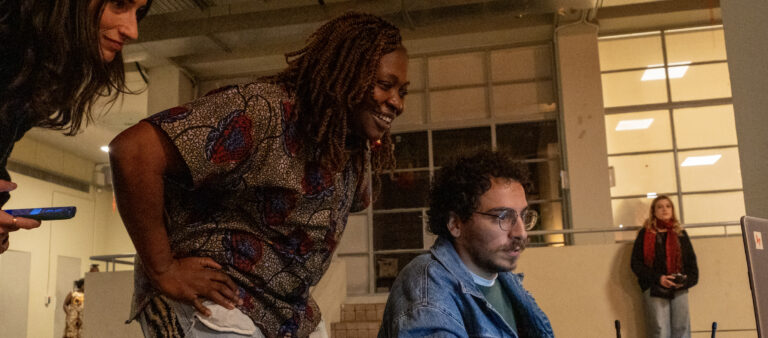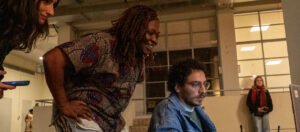In one of Zahle’s neighborhoods, George — a man in his forties who has been paralyzed on one side since childhood (declining to mention his surname) — sat on an old wooden chair in front of his home on the day of the 2025 municipal and local elections. George lives with his elderly mother, who can no longer help him as she once did. Yet he was eager to participate in the elections. He had followed the campaigns, taken notes, and chosen the candidate he believed best suited to serve his area. The problem was not his disability, but his lack of a wheelchair — and the polling stations were not equipped to accommodate him.
Fortunately, friends and neighbors were there to help him exercise his right, just like any other Lebanese citizen. When asked why he was so determined to vote, he replied: “I only wanted to be part of the decision and to have a say, because my voice deserves to be heard.”
George was not seeking secondary comforts in life; rather, as he put it: “This is the highest and most important right we must claim. We live in a country that celebrates with millions of dollars and holds massive festivals when winning, without considering — even for a moment — how that money could revive the area and its people, including us.”
Persons with disabilities have the full right to political participation, foremost among them the right to vote, just like any other members of society. This right should not be seen as a privilege, but as an integral part of citizenship. Democracy can only be complete when all groups participate, without exclusion or discrimination. Enabling persons with disabilities to vote means removing the barriers that prevent them from reaching polling stations and providing the necessary accommodations for their needs — whether physical, auditory, visual, or intellectual.
Including them in the electoral process is not only a legal and humanitarian duty, but also a step toward building a more inclusive society. In other words, it is not enough to simply grant them the right; active measures must be taken to ensure they can exercise it, just like anyone else in the community.
“I focused on the right to run for office and participate in decision-making, but people understood it as me seeking sympathy because I’m in a wheelchair.”
Amal Al-Sharif, one of the candidates on the “Beirut Madinati” list and a person with a disability, spoke to Sila Wasl about her experience, saying: “This is not the first time I have run with the ‘Beirut Madinati’ list.”
“But what was different this time was that the campaign period was extremely short, as my candidacy was confirmed over the weekend. On top of that, the financial strain caused by the economic crisis that has affected us all made things even harder. This time, the challenges were greater, such as gaining access to the media, despite the individual efforts made by news outlets.”
I was accused this time of evoking people’s pity and seeking their sympathy, exploiting my condition to reach my goal — even though my goal was to focus on the right of access.
She stresses that “I was not the only candidate with a disability in the elections; there was a young man from Tripoli and young women from Zahle and Aley who took the same step. But unlike in 2016, I was accused this time of evoking pity and sympathy to serve my aims, even though my goal was to highlight the right of access. Legally, Law 220 for persons with disabilities was issued in 2000 and should already be in effect. However, implementing this law must start within state institutions.
Municipalities are part of these bodies that are supposed to enforce the law, especially the sections related to infrastructure, which they are obligated to implement. When I personally emphasize the right to run for office and participate in decision-making, I am not speaking only about persons with disabilities, but also about the elderly, the sick, children in strollers, and anyone unable to use stairs.”
From this perspective, Al-Sharif clarifies: “Implementing Law 220 of 2000 is not only linked to municipalities, but to municipal work as a whole. That is why I kept emphasizing the right of access — not because I’m in a wheelchair trying to gain sympathy. This is what surprised me. We are talking about more than 25% of the country’s population.”
Finally, she stresses: “The Beirut port explosion and the recent war between Israel and Lebanon have increased disability rates in Lebanon. On this basis, we must equip polling stations for everyone, because it is a guaranteed right.”
On the Ground, the Situation Is Dire
Marc Boulos, an activist working with one of the electoral teams in Zahle, recalls: “At exactly 5 p.m. on Sunday, May 18 — municipal and local election day in Zahle — about two hours before the polls closed, we received word about enthusiastic voters, most of them women, eager to cast their ballots. But their health conditions, and the state of our polling centers, made it impossible to accommodate them. We borrowed a single wheelchair from the nearby Red Cross station and went one by one to get them to vote. Imagine how exhausting that was.”

Participation of elderly voters in one of Zahle’s polling stations
Boulos calls for: “Upgrading these centers. We helped about 15 men and women, but I’m sure the number was much higher. If we could have done more, we wouldn’t have hesitated. But time was against us, especially since our buildings have narrow staircases and our village ‘Wadi Al-Araish’ has many alleyways. This is a serious issue that needs to be addressed as soon as possible.”
A significant number of party representatives took advantage of the situation, assisting persons with disabilities and elderly voters as a pretext to influence them — casting votes on their behalf without respecting their right to freely express their own choices.
Raji Keyrouz, media coordinator at the “LADE” association, points out: “As an association, we monitor elections in general, and we also monitor a small part of the process related to persons with disabilities. What caught our attention most was that the polling stations were not equipped to receive these individuals.”
He adds: “Under our electoral law, it is possible for a second voter to assist a person with a disability in casting their ballot. Unfortunately, a large number of party representatives exploited this opportunity, helping persons with disabilities and the elderly as a pretext to vote on their behalf, without respecting their choice or their independence in expressing their legitimate vote.”
Where Does the Law Stand on This?
Yes, persons with disabilities have the right to vote — it is a fundamental human right. It is guaranteed by international agreements such as the Convention on the Rights of Persons with Disabilities (CRPD), whose Article 29 states that persons with disabilities have the right to participate in political and public life, including the right to vote and run for office, on an equal basis with others.
This right includes: access to polling stations; provision of voting methods adapted to various disabilities (such as audio assistance); ensuring the secrecy and independence of the vote; and protection from discrimination or exclusion due to disability.




















